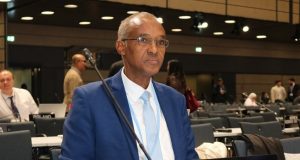The United Nations Environment Programme (UNEP) has released the “Emissions Gap Report 2024”, presenting stark warnings and critical insights into the global progress, or lack thereof, in reducing greenhouse gas emissions. The report highlights an urgent need for more ambitious climate action to meet the Paris Agreement goal of limiting global warming to 1.5°C above pre-industrial levels.

As the world looks ahead to COP29, African nations face unique climate challenges, with the region disproportionately affected by climate change despite contributing only about 4% of global emissions. The 2024 report calls for both immediate and transformative measures globally, including in Africa, to avoid the devastating effects of climate change on food security, water availability, and economic stability.
Key Highlights of the Emissions Gap Report 2024
1. Current Emissions Trajectory: The report finds that despite some progress, the world is still on a trajectory to reach 2.7°C of warming by the end of the Century, far exceeding the Paris Agreement targets. Global emissions need to be cut by 45% by 2030 to keep the 1.5°C target within reach.
2. Fossil Fuel Dependency: The ongoing reliance on fossil fuels remains a significant barrier. While renewables are expanding, coal, oil, and gas continue to dominate the global energy mix, especially in regions with fast- growing energy demand. The report stresses the need for rapid and just decarbonisation of the energy sector and a shift towards renewable energy, particularly in Africa, where energy access is a pressing development issue.
3. Finance and Technology for Africa: Africa is cited as a region where significant climate finance and technology transfer are crucial. Despite the
$100 billion annual climate finance commitment made by developed nations, actual flows to Africa have lagged. The report emphasises the urgent need for scaled up finance and investments in adaptation and mitigation technologies across the continent to build climate resilience.
4. Sectoral Transformations: To bridge the emissions gap, the report calls for radical transformations across key sectors:
i. Energy: The energy transition is critical. Africa’s abundant renewable resources, such as solar and wind, present a unique opportunity for clean energy leadership.
ii. Agriculture and Land Use: With agriculture forming the backbone of many African economies, sustainable practices and investments in climate-smart agriculture are necessary to protect food security while reducing emissions.
iii. Urbanisation: The rapid urban growth in Africa presents both challenges and opportunities. Sustainable urban planning and infrastructure development can mitigate emissions while fostering economic growth.
5. Adapting to a Warmer Future: The report highlights that climate adaptation remains a priority for Africa, where extreme weather events – droughts, floods, and heatwaves – are becoming more frequent and severe. Strengthening local and national capacities for adaptation is vital, alongside enhancing climate resilience in sectors such as health, water management, and infrastructure.
African Leadership in Climate Action
The Nairobi Declaration, adopted at the inaugural Africa Climate Summit in 2023, noted that, despite the global challenges, African nations are making significant strides in climate leadership. This year at COP29 (‘the Finance COP’), Africa is calling for an ambitious, accessible and predictable climate finance goal and enhanced international cooperation to drive impactful climate action and support full implementation of Africa’s NDCs, NAPs, Loss and Damage and Just Transitions.
Call to Action from Amb Ali Mohamed
As the world prepares for COP29, the Emissions Gap Report 2024 serves as a clarion call for all nations to raise their climate ambitions.
Amb Ali Mohamed, the Kenya Special Envoy for Climate Change and Chair of the African Group of Negotiators (AGN), underscores the importance of global solidarity and climate justice, especially for vulnerable regions like Africa that are bearing the brunt of climate impacts.
He urges that, with stronger financial commitments, technological innovation, and bold political leadership, there is still a chance to bridge the emissions gap and secure a sustainable future for Africa and the world.
